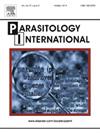The gut microbiome–helminth–immune axis in autoimmune diseases
IF 1.5
4区 医学
Q3 PARASITOLOGY
引用次数: 0
Abstract
The global prevalence of autoimmune diseases has surged in recent decades. Consequently, environmental triggers have emerged as crucial contributors to autoimmune diseases, equally relevant to classical risk factors, such as genetic polymorphisms, infections, and smoking. Sequencing-based approaches have demonstrated distinct gut microbiota compositions in individuals with autoimmune diseases, including multiple sclerosis, rheumatoid arthritis, type 1 diabetes mellitus (T1D), and systemic lupus erythematosus, compared to healthy controls. Furthermore, fecal microbiota transplantation and microbial inoculation experiments have supported the hypothesis that alterations in the gut microbiota can influence autoimmune responses and disease outcomes. Herein, we propose that intestinal helminths may serve as a critical factor in inducing alterations in the gut microbiota. The concept of helminth-mediated suppression of autoimmune diseases in humans is supported by substantial evidence, aligning with the long-standing “hygiene hypothesis.” This review focused on T1D to explore the interactions between parasites, gut microbiota, and the immune system—a topic that remains a black box within this intricate triangular relationship.
自身免疫性疾病中的肠道微生物-蠕虫-免疫轴。
近几十年来,全球自身免疫性疾病的发病率急剧上升。因此,环境诱因已成为自身免疫性疾病的重要诱因,与基因多态性、感染和吸烟等传统风险因素同样重要。基于测序的方法已经证明,与健康对照组相比,自身免疫性疾病(包括多发性硬化症、类风湿性关节炎、1 型糖尿病(T1D)和系统性红斑狼疮)患者的肠道微生物群组成各不相同。此外,粪便微生物群移植和微生物接种实验也支持肠道微生物群的改变可影响自身免疫反应和疾病结果的假设。在此,我们提出肠道蠕虫可能是诱导肠道微生物群改变的关键因素。蠕虫介导的抑制人类自身免疫性疾病的概念得到了大量证据的支持,与长期存在的 "卫生假说 "相吻合。本综述以 T1D 为重点,探讨寄生虫、肠道微生物群和免疫系统之间的相互作用--在这一错综复杂的三角关系中,这一话题仍是一个黑箱。
本文章由计算机程序翻译,如有差异,请以英文原文为准。
求助全文
约1分钟内获得全文
求助全文
来源期刊

Parasitology International
医学-寄生虫学
CiteScore
4.00
自引率
10.50%
发文量
140
审稿时长
61 days
期刊介绍:
Parasitology International provides a medium for rapid, carefully reviewed publications in the field of human and animal parasitology. Original papers, rapid communications, and original case reports from all geographical areas and covering all parasitological disciplines, including structure, immunology, cell biology, biochemistry, molecular biology, and systematics, may be submitted. Reviews on recent developments are invited regularly, but suggestions in this respect are welcome. Letters to the Editor commenting on any aspect of the Journal are also welcome.
 求助内容:
求助内容: 应助结果提醒方式:
应助结果提醒方式:


